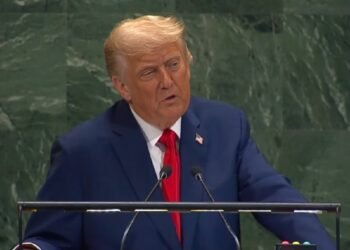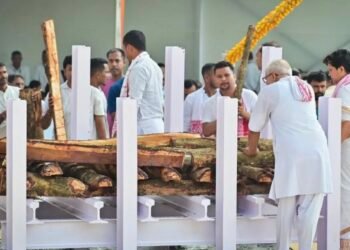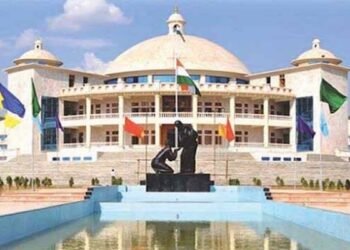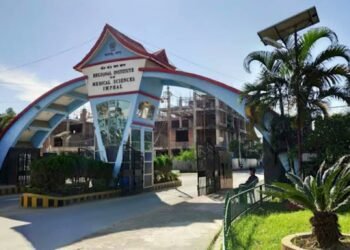KOHUR contests Biren Singh’s use of “manipulated” census data and unreliable historical texts to falsely delegitimize Kukis and portray them as outsiders in their own land.
BY PC Bureau
| June 22, 2025 — The Kuki Organisation for Human Rights Trust (KOHUR) has issued an exhaustive rebuttal to a memorandum submitted by former Manipur Chief Minister N. Biren Singh to Governor Ajay Kumar Bhalla. In their rejoinder dated June 21, KOHUR accuses Singh of deliberately spreading misinformation, distorting historical records, manipulating demographic data, and weaponizing refugee concerns to advance a divisive and dangerous ethnic agenda.
KOHUR contends that Singh’s memorandum, submitted on May 27, 2025, purports to identify and deport so-called illegal immigrants from Myanmar and Bangladesh but in reality constitutes a calculated effort to demonize the Kuki-Zo people and justify what they term as a state-sponsored pogrom. The organization proceeds to address, paragraph by paragraph, what they describe as “mischievously crafted falsehoods” aimed at delegitimizing an entire community.
Questionable Use of the Cheitharol Kumbaba
KOHUR begins by taking exception to Singh’s invocation of the Cheitharol Kumbaba—the royal chronicle of the Meitei kings—as a historical source. They cite the works of Nepram Bihari and Dr. Saroj Nalini Parratt, both of whom have explicitly noted that the Cheitharol was reconstructed during the reign of King Bhagyachandra in the 18th century. Key sections were lost and rewritten, with excessive reign lengths assigned to ancient monarchs—some as long as 100 to 120 years, which KOHUR argues is scientifically implausible given average life expectancies at the time.
KOHUR contends that the chronicle served more as a dynastic propaganda tool than a reliable historical document and asserts that its early content was likely drawn from myths and cultural memory, not factual evidence. Quoting Parratt, they argue that “the framework was constructed to legitimize Meitei confederacy while marginalizing other tribes.”
Refuting Historical Claims to Territorial Sovereignty
On Singh’s claims of historical Meitei sovereignty over all of Manipur, KOHUR cites British records and the 1795 account of Major Michael Symes, who described Meitei territory as confined to the Imphal Valley, surrounded on all sides by “Cookie mountains.” The organization stresses that Manipur’s borders were undefined before the 1830s and were only formally established around 1894–96.
They also assert that the rivers Tuivai, Chakpi, Imphal (beyond Sugunu), and Tuipui—located in today’s Churachandpur and Chandel districts—were not part of pre-colonial Manipur, thereby debunking Singh’s territorial narrative.
Census Data Manipulation
KOHUR takes issue with Singh’s use of 1881 census data to claim a surge in Kuki population. They highlight that the 1881 census merely estimated populations in the hill regions without proper enumeration. Furthermore, Churachandpur, Pherzawl, and Chandel were not included in the data collection at that time.
They present alternative data from the 1901 census, which they argue is the earliest reliable baseline. KOHUR presents detailed demographic figures, showing that the population growth among Meiteis (824%), Nagas (1002%), and Kukis (952%) over 130 years is relatively proportional when compared by standard decadal growth metrics. They warn that Singh’s selective use of 1881 figures is “deliberate and sinister,” intended to construct a false narrative of illegal demographic expansion.
READ COMPLETE Rejoinder to N. Biren Singh Memorandum
Criminalization of Refugees from Myanmar
KOHUR rebuts Singh’s depiction of Kuki-Chin refugees as “illegal immigrants,” stating that many of these individuals were originally Indian citizens who migrated to Myanmar’s Kabaw Valley under colonial rule. Following the 1967 “Khadawmi Operation” by the Burmese military, many fled back to India.
READ: US Travel Advisory for India: Crime Rates Reveal American Hypocrisy
Contrary to Singh’s claims, KOHUR asserts these individuals were received with state support at the time and were never designated as “illegal.” They accuse Singh of criminalizing refugees in violation of international humanitarian norms—detaining, jailing, and deporting vulnerable populations back into conflict zones controlled by the Myanmar junta.
Unequal Refugee Policy
KOHUR notes the stark contrast in Singh’s treatment of Naga and Kuki refugees. While Tangkhul refugees from Myanmar were granted aid and settlement opportunities, Kuki refugees were jailed and repatriated. KOHUR describes this as state-sanctioned ethnic discrimination.
They further note that Singh’s letter falsely portrays these humanitarian cases as national security threats and labels them as criminals without due process.
On Ceasefire Agreements
Responding to Singh’s criticism of the Suspension of Operations (SoO) with Kuki groups, KOHUR reminds that Singh himself was part of the Congress government that signed the agreement. The SoO was not an individual pact but a structured peace agreement with the Kuki National Organisation (KNO) and the United People’s Front (UPF).
They contrast this with Singh’s November 2023 agreement with the Meitei UNLF (Pambei faction), a designated terrorist organization, calling it “an act of ethnic partiality and political hypocrisy.”
“Ghost Villages” and Socioeconomic Realities
KOHUR provides a nuanced explanation for the increase in Kuki villages in Churachandpur and Kangpokpi:
Forced Migration during the Kuki-Naga clashes in the 1990s led many Kukis to relocate from Ukhrul and Tamenglong.
Corruption under MGNREGA led to the creation of “ghost villages” for financial gain, often in collusion with state officials.
Urbanization Trends encouraged resettlement near towns due to lack of amenities in remote hill areas.
Sociocultural Practices among the Kukis fostered village formation based on familial and chieftain lineages.
KOHUR insists that these are domestic trends, not consequences of illegal immigration.
Poppy Cultivation and the Drug Trade
KOHUR argues that poppy cultivation among Kukis is driven by economic desperation, not criminal intent. They claim Meitei elites and insurgents are the principal actors in Manipur’s drug economy, using hill populations as labor.
READ: Tribal Body Demands Cancellation of Adani Land Deal in Assam
They cite the case of police officer Thounaojam Brinda, who accused Singh of shielding major drug lords, and suggest that Singh’s “war on drugs” was a cover to suppress competition while allowing Meitei-led cartels to flourish.
Refugee Disinformation
KOHUR accuses Singh of peddling falsehoods, including claims that 900 Kuki refugees crossed the border to fight. Security agencies later confirmed the figures were fabricated. In one case, eleven Myanmarese nationals injured in conflict were granted medical entry by Indian forces—an act twisted by Singh to promote xenophobia.
They further cite that the 10 individuals killed at the Indo-Myanmar border were members of the Myanmar-based People’s Defence Force (PDF), not Kuki militants. Singh’s attempts to link every incident to the Kukis reflect, KOHUR says, “a psychopathic obsession with vilifying one ethnic group.”
Administrative Suppression and Constitutional Evasion
KOHUR also counters Singh’s statements on the Presidential Order of 1972, which created the Hill Areas Committee (HAC). They argue that this order was never properly implemented due to systematic obstruction by the Meitei-dominated state government. Rather than misuse, the Order was chronically ignored despite repeated tribal appeals.
Final Appeal to the Governor
KOHUR’s closing appeal urges Governor Ajay Kumar Bhalla to rise above communal narratives and recognize the factual distortions and hate speech embedded in Singh’s memorandum. They attach supporting documents—including extracts from the 1901 Census, historical maps, and scholarly commentaries—and implore the Governor to uphold constitutional values, protect tribal rights, and reject any narrative that sows communal hatred.
Signed by H.S. Benjamin Mate, Chairman of the Kuki Organisation for Human Rights Trust, the letter ends with a resonant quote: “Truth has a certain ring to it.” KOHUR expresses hope that justice, compassion, and factual integrity will prevail over rhetoric and repression













